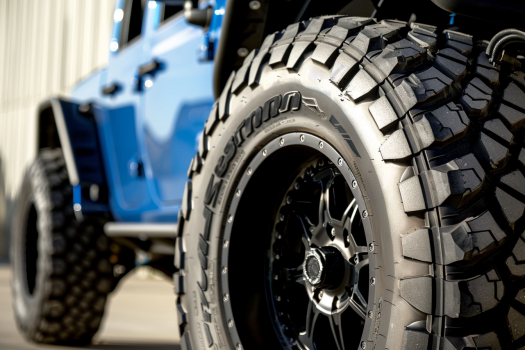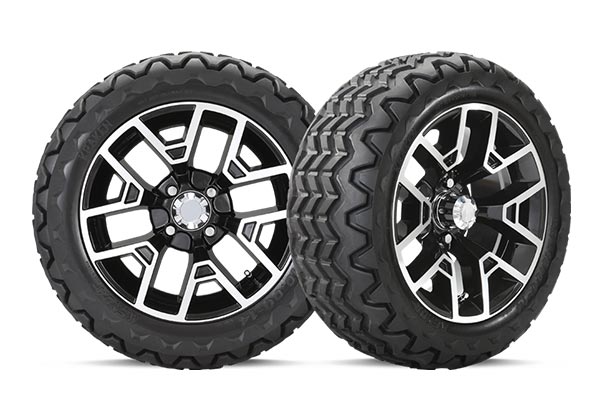Last Updated on August 5, 2025
The Most Popular Tire Brands of the Year
Welcome to our comprehensive guide on tire brands, a critical automotive safety and performance component. This introduction will explore the importance of quality tires and the criteria for selecting top tire brands. Dive into the world of the most popular tire brands, where we explore the leaders in the tire industry. Learn about the brands motorists trust the most for their vehicles, highlighting their reputation for quality, innovation, and reliability.
Understanding the Importance of Quality Tires
Quality tires are more than just a part of your vehicle; they are fundamental to its safety, fuel efficiency, and overall performance. Here’s why they’re so important:
- Safety: Your vehicle’s only point of contact with the road is its tires. High-quality tires improve grip, lowering the danger of accidents in various driving circumstances. They are also essential for braking efficiency and handling stability, especially in inclement weather like rain or snow.
- Performance: The correct tires can improve your vehicle’s handling, allowing you to drive more smoothly and responsively. They can dramatically increase turning and acceleration, determining how much fun and capable your automobile is.
- Gasoline Efficiency: Tires significantly impact how much gasoline your car uses. Low rolling resistance tires, for example, take less energy to move, resulting in fuel savings over time.
- Comfort: Quality tires may minimize road noise and absorb shocks more effectively, resulting in a more comfortable ride. This is necessary for long trips.
- Longevity: Investing in quality tires implies they will last longer. This is not only cost-effective in the long run but also reduces the frequency of tire replacements, helping to ensure environmental sustainability.

Factors for Selecting Top Tire Brands of the Year
When it comes to choosing the best tire brands, several factors come into play:
- A brand’s reputation is an important indicator based on years of consistent quality and customer happiness. Consumer and industry experts’ online reviews and ratings provide helpful information about the dependability and performance of various tire brands.
- Tire performance is evaluated using a variety of tests, including braking distance, handling, wear, and fuel efficiency. Brands that consistently perform well on these tests are generally an excellent choice.
- Top brands often offer diverse tires to suit various cars and driving conditions. A varied product line for passenger vehicles, SUVs, trucks, or particular demands such as winter or off-road indicates a brand’s knowledge and commitment to meeting all consumer needs.
- Leading tire manufacturers engage in research and development to introduce innovative technologies that enhance safety, efficiency, and sustainability. Innovations in tread design, rubber compounds, and tire manufacturing are all important considerations.
- While the cheapest option isn’t always the best, the most expensive one may be vital for some drivers. The top brands strike a solid price-to-value balance in terms of longevity, performance, and safety.
- A good contract demonstrates the company’s belief in its goods. After-sales service, which includes tire maintenance and replacement help, is also an important consideration when selecting a tire brand.
History and Evolution of Tire Technology
The story of tire technology is an exciting journey from humble beginnings to the high-tech developments we witness today. This evolution results from breakthroughs in materials and design, a response to changing transportation needs, and greater attention to safety and sustainability.
Discover the exciting progression of tire technology, from the first rubber rings to today’s advanced treads. This section describes how tire design and production have evolved to meet shifting needs and technological breakthroughs.
From Rubber Rings to High-Tech Treads
The earliest tires were regular bands of metal fitted around wooden wheels, used primarily on carts and wagons. The introduction of the rubber tire, however, marked a significant turning point.
- Early Rubber tires: The early rubber tires were solid and not pneumatic. John Boyd Dunlop, a Scottish veterinarian, is credited with creating the first workable pneumatic tire in 1888. His invention was first meant to improve the comfort of his son’s bicycle rides by putting air-filled tubes on the wheels.
- Pneumatic Tires: Pneumatic tires quickly evolved and made their way onto autos. Its improved shock-absorbing capabilities over solid rubber made it excellent for uneven roads at the time.
- Radial Tires: The next significant advancement came in the 1940s with Michelin’s introduction of radial tires. Unlike the other tire designs, which had fabric cords diagonally attached to the tread, radial tires had cables at right angles. This allowed for improved grip, longer tread life, and better fuel efficiency.
- Tubeless Tires: In the 1950s, tubeless tires were developed, which reduced the risk of sudden blowouts and made tires easier to maintain.
Over time, the focus shifted to improving tire tread patterns, rubber compounds, and overall design to enhance performance in various weather conditions and driving environments.
Innovations Shaping Modern Tire Manufacturing
Today’s tire industry is characterized by ongoing innovation driven by technical advancements and changing consumer expectations.
- Advanced Rubber Compounds: Modern tires incorporate rubber compounds to improve grip, wear resistance, and environmental friendliness. For example, many tires now use silica-based compounds instead of carbon black to minimize rolling resistance and enhance fuel economy.
- Run-Flat Technology: This innovation allows tires to retain their shape and function for a short amount of time after a puncture, hence improving safety.
- Low Rolling Resistance tires: These tires are designed to reduce the energy lost as heat when they roll, improving fuel efficiency.
- Eco-Friendly tires: As environmental concerns grow, tire manufacturers are increasing their focus on sustainability. This includes using renewable materials, streamlining manufacturing processes to reduce waste, and developing more fuel-efficient tires.
- Innovative tire Technologies: Integrating sensors and digital technology into tires is becoming increasingly popular. These “smart tires” can monitor their status (such as air pressure and tread depth) and send real-time data to the driver or vehicle systems, improving safety and efficiency.
- Customization for Electric Vehicles: As electric vehicles (EVs) become more prevalent, tires are being designed specifically for them, considering factors like increased torque and heavier weight due to batteries.
The history and evolution of tire technology reflect a fascinating interplay of innovation, safety, and sustainability. From the humble rubber ring to today’s sophisticated, high-tech treads, tires have continually evolved to meet the ever-changing demands of transportation and mobility. As we look to the future, it’s clear that tire technology will continue to advance, playing a crucial role in shaping the future of driving.
Brand Spotlight: The Market Leaders
Several tire brands have emerged as leaders in the industry due to their innovation, performance, and quality. Let’s throw light on some of the market giants. In this section, we highlight the market’s top tire brands. Discover each major brand’s unique advantages and innovations, from Continental’s performance emphasis to Michelin’s eco-friendly strategy, and learn what distinguishes them in the competitive tire sector.
Continental: Pioneering Performance
Based in Germany, Continental is known for its innovative spirit in tire technology. Known for its high-performance tires, Continental has continuously set industry benchmarks.

- Continental tires are known for their innovative features, such as the ContiSeal, which automatically seals punctures, and the ContiSilent, which lowers interior noise.
- Performance and Safety: The brand values performance while maintaining safety. Their tires frequently have exceptional handling and braking qualities, particularly in challenging situations.
- Continental offers diverse tires for passenger cars, trucks, and even bicycles, demonstrating their versatility in the tire business.
Pirelli: Durability Meets Design
An Italian brand, Pirelli is connected with long-lasting, high-performance tires frequently associated with luxury and sports cars.

- High-Performance Focus: Pirelli tires are well-known for superior performance in sports and luxury vehicles, giving excellent grip and handling at high speeds.
- Design Aesthetics: Pirelli has also earned a name by incorporating design aesthetics into tire manufacture, appealing to a customer base that values performance and visual appeal.
Pirelli stands out by using new materials and tread designs, particularly in its P Zero brand, which is popular among sports car fans.
Michelin: The Eco-Friendly Choice
Michelin, A French tire company, stands out for its commitment to sustainability and high-quality tire options.

- Eco-Friendly Initiatives: Michelin has been a leader in developing eco-friendly tires, using sustainable materials, and striving for a lower environmental impact.
- Longevity and Durability: Michelin tires are well-known for their extended tread life and durability, giving customers good value for money and eliminating the need for frequent replacements.
- Wide Range of Options: The company’s comprehensive product range covers every vehicle type, including passenger cars, motorcycles, and heavy-duty vehicles.
Bridgestone: All-Season Specialists
Bridgestone is a Japanese company well-known for its all-season tires, which provide dependability and performance throughout the Year.
- All-Season Expertise: Bridgestone’s all-season tire lineup, including the Turanza and Dueler series, is known for its versatility, providing good performance in various weather conditions.
- Technological Advancements: The company’s commitment to R&D has resulted in breakthroughs in tire composition and tread design, which improve safety and efficiency.
- Global Presence: Bridgestone’s global reach and abundant availability make it a popular choice for many drivers globally.
Hankook: The Luxury Experience
Hankook, a South Korean brand, has carved out a position in the tire technology industry by giving a luxurious experience.

- Luxury and Comfort: Hankook tires are designed to deliver a pleasant and comfortable driving experience, with high ratings for noise reduction and ride smoothness.
- Innovative Design: The brand has made significant progress in creative design. An example is its Ventus series, which is popular among high-end vehicle customers.
Despite its high-end features, Hankook maintains competitive pricing, making it an appealing alternative for people looking for luxury at a more affordable price.
Analyzing Performance: What Sets These Brands Apart
In the highly competitive tire sector, distinguishing features like tread life, handling, fuel efficiency, and customer happiness are essential. Let’s examine these details to see what differentiates the top tire brands. Here, we examine the key features that define the best tire companies, such as tread life, durability, handling in various conditions, fuel efficiency, and customer happiness. Understand what to look for in a tire and how the top brands meet these requirements.
Tread Life and Durability
Tread life and longevity are critical markers of a tire’s quality and long-term value. They decide how long a tire can function properly before it needs to be replaced.
- Advanced Rubber Compounds: Using new rubber compounds substantially impacts tread life. Brands that invest in high-quality, wear-resistant materials typically have longer shelf lives for their goods.
- Tread Design: The tread pattern and depth also affect durability. More robust designs with deeper grooves are more resistant to wear and tear, especially under intense driving conditions.
- Durability Test: Leading brands frequently submit their tires to rigorous durability testing that simulates various road conditions to assure long-lasting performance.
Handling and Traction in Diverse Conditions
A tire’s capacity to maintain grip and stability under varying driving conditions is crucial to safety and performance.
- All-Weather Performance: Some brands excel at producing all-weather tires that give dependable traction in dry and rainy situations and on snow and ice.
- Tread Pattern and Siping: Innovative tread patterns and siping (small openings in the tread) improve grip and water evacuation, resulting in better handling in wet and slippery conditions.
- Sidewall Construction: The construction of a tire’s sidewall also influences handling. Stiffer sidewalls can enhance cornering stability and reaction.
Fuel Efficiency and Eco-Friendly Features
With increasing environmental awareness, fuel efficiency and eco-friendly featur7es have become essential in setting brands apart.
- Low Rolling Resistance: Tires with low rolling resistance use less energy to keep moving, improving fuel efficiency.
- Sustainable Materials: An increasing trend is using environmentally friendly materials in tire production. These comprise recycled materials and renewable resources such as natural rubber and silica.
- Eco-Friendly Production: Brands that use ecologically responsible production processes to reduce carbon footprints and waste are growing popular with environmentally conscious consumers.
Customer Satisfaction and Warranty Offers
Customer satisfaction and comprehensive warranty offerings are critical differentiators for tire businesses, increasing consumer trust and loyalty.
- Customer Reviews and Ratings: Brands that consistently earn positive customer feedback and ratings tend to excel in quality, performance, and after-sales support.
- Warranty Coverage: Extensive warranty coverage, such as tread life warranties and satisfaction guarantees, shows a company’s confidence in its product and dedication to customer pleasure.
- After-sales Assistance: Excellent after-sales assistance, such as customer service, tire maintenance advice, and hassle-free warranty claims, helps to increase overall customer satisfaction.
Analyzing tire brand performance regarding tread life, handling, fuel efficiency, and customer happiness indicates why some brands outperform others.
These factors not only determine the functional performance of the tires but also influence consumer preferences, brand reputation, and, ultimately, market leadership.
The Future of Tires: Emerging Trends and Technologies
The tire business is on the verge of a new era, fueled by technical advancements and a shift towards sustainability. Let’s look at the key trends and technologies influencing the future of tires. In this section, we’ll look at the fascinating future of tire technology. Learn about the trends and technical breakthroughs influencing the future of tires, from intelligent tires to sustainable production processes.
Innovative Tires: The Next Big Thing?
Innovative tires represent an essential development in tire technology. They combine sensors and IoT (Internet of Things) capabilities to deliver real-time data while improving safety and performance.
- Integrated Sensors: These sensors can monitor several aspects of tire health, including pressure, temperature, and tread depth, and warn drivers of potential problems before they become dangerous.
- Connectivity and IoT Integration: Smart tires can interface with a vehicle’s onboard computer systems, delivering data to improve performance. In the future, this information could be incorporated into more extensive traffic management and innovative city systems.
- Adaptive tires: In the future, tires may adjust their features, such as inflation level or tread pattern, to meet road conditions, thereby increasing safety and efficiency.
Sustainable Practices in Tire Manufacturing
Sustainability is becoming a significant priority in tire manufacturing, with businesses looking for ways to reduce environmental effects.
- Eco-friendly Materials: There is a growing trend of using sustainable materials such as bio-based rubbers, recycled plastics, and dandelion rubber to reduce dependency on traditional petroleum-based products.
- Recycling and Upcycling: Advances in tire recycling techniques are making it easier to convert old tires into new products, such as new tires, road surfaces, and more.
- Reduced Carbon Footprint: Tire manufacturers are investing in cleaner, more energy-efficient manufacturing methods to address the growing demand for environmentally friendly products.
Predictions for the Next Decade
The next decade promises further advancements and transformations in the tire industry.
- Tires for Driverless Vehicles: As self-driving cars become more common, tires must adapt to the new technologies. This could include increased durability to withstand the regular use of fleet cars and specialized designs for peak performance and safety.
- Advanced Airless tires: The development of airless or non-pneumatic tires is anticipated to continue. These tires promise to eliminate the chance of punctures and require less maintenance, making them appropriate for various applications.
- Customization and personalization: With developments in manufacturing technology such as 3D printing, we may see an increase in customized tires designed for specific cars, driving styles, and environmental circumstances.
Choosing the Right Tire for Your Needs
Selecting the right tire ensures your vehicle’s safety, performance, and efficiency. This decision involves understanding tire specifications, matching tires to your vehicle type and usage, and balancing price with performance.
Selecting the right tire is crucial for safety and performance. This part provides essential guidance on understanding tire specifications, matching tires to your vehicle and driving conditions, and balancing price with performance.
Understanding Tire Specifications
Tire specifications can be daunting at first glance, but they provide essential information about the tire’s capabilities and compatibility with your vehicle.
- Size and Fit: The tire’s size, usually printed on its sidewall, is a critical specification. This includes width, aspect ratio (the height of the tire’s sidewall as a percentage of its width), and diameter. It’s vital to choose a tire size that is recommended for your vehicle.
- Load Index and Speed Rating: The load index indicates the maximum weight a tire can safely carry, while the speed rating signifies the top speed at which the tire can operate safely. Both are crucial for your vehicle’s performance and safety.
- Treadwear, Traction, and Temperature Ratings: These ratings provide insights into how long the tread is expected to last (treadwear), how well the tire grips the road (traction), and how well it can withstand heat (temperature).
Matching Tires to Vehicle Type and Usage
The correct tire depends mainly on your vehicle type and how you use it.
- Passenger Vehicles: All-season tires are often a good choice for regular passenger cars, providing balanced performance in various weather conditions.
- SUVs and trucks: These vehicles may require tires with higher load capacities. All-terrain tires might be appropriate for those who frequently drive off-road.
- Performance Vehicles: Sports and other high-performance vehicles may benefit from specialized tires that offer better grip and handling at higher speeds.
- Climate Considerations: If you reside in an area with harsh winters, investing in winter tires with deeper treads and specialized snow and ice patterns may be necessary. In contrast, tires that can tolerate high temperatures would be better suited to hot locations.
Price vs. Performance: Finding the Best Value
Finding the right balance between price and performance is essential when buying a cost-effective tire.
- Budget vs. Premium Brands: While premium tires may provide the best performance and longevity, several low-cost brands offer adequate quality and safety. It’s about getting a tire that matches your demands without overspending.
- Long-term Costs: Consider both the original price and the long-term costs. A cheaper tire that wears out rapidly may be less cost-effective than a more costly tire that lasts longer.
- Special Offers and Warranty: Look for sales, discounts, and warranties that add value. A good contract can provide peace of mind and long-term cost savings.
Conclusion & Recommendations
As we wrap up our complete guide to tires, let’s review the biggest brands and their products, followed by concluding remarks and consumer recommendations. In conclusion, we summarize our findings on the best tire brands and make final buyer recommendations. This section strives to provide the information you need to make informed tire purchasing decisions, ensuring your safety, efficiency, and satisfaction on the road.
Recap of Top Tire Brands of the Year and What They Offer
- Continental: Known for pioneering performance, Continental offers innovative technologies like ContiSeal and a wide range of products for various vehicle types.
- Pirelli: Synonymous with durability and design, Pirelli specializes in high-performance tires, particularly for luxury and sports cars.
- Michelin: A leader in eco-friendly tire technology, Michelin is renowned for its long tread life, sustainability efforts, and comprehensive product range.
- Bridgestone: Bridgestone stands out as an all-season specialist, offering a broad selection of versatile tires suitable for various weather conditions.
- Hankook: Offering a luxury experience, Hankook combines innovative design with competitive pricing, catering to high-end vehicle owners.
Final Thoughts and Recommendations for Buyers
Choosing the right tire is crucial for safety, efficiency, and the overall driving experience. Here are some critical recommendations for buyers:
- Understand Your Needs: Assess your driving conditions, vehicle type, and personal preferences. Whether it’s all-season versatility, performance handling, or eco-friendly options, your needs will guide your choice.
- Consider Long-Term Value: Look beyond the initial price. Factors like durability, fuel efficiency, and warranty offers can provide long-term savings and peace of mind.
- Stay informed: Keep up with the latest trends and advancements in tire technology. Innovative tires and sustainable practices are shaping the future, and staying informed will help you make a more educated choice.
- Seek Expert Advice: If in doubt, consult tire experts who can provide personalized recommendations based on your circumstances.
As you contemplate your next tire purchase, consider visiting Tires Easy, a comprehensive online platform offering a vast selection of tires from all the leading brands. Whether you’re looking for high-performance tires for your sports car or durable all-season tires for your family vehicle, Tires Easy has options to suit every need.
Explore our extensive range and take advantage of detailed product descriptions, customer reviews, and competitive pricing. With an easy-to-navigate website and convenient delivery options, finding and purchasing the perfect tire has never been easier.
Click here to find your perfect tire today!
Your safety and satisfaction are our top priorities, and we trust Tires Easy will help you choose the best driving needs.
FAQs
What is the best brand of tires?
Your vehicle’s type, driving method, and personal preferences all influence which tire brand is ideal for you. Continental, Michelin, and Bridgestone are well-known for their quality and performance.
What is the finest tire brand?
The optimum tire brand can vary depending on your specific needs. Continental is a popular choice for performance, Michelin is known for durability, and Bridgestone is known for its all-season adaptability.
Which are the top ten tire companies?
Continental, Michelin, Bridgestone, Goodyear, Pirelli, Hankook, Yokohama, Cooper, Kumho, and Toyo are among the top ten tire manufacturers known for their global presence and innovative tire designs.
Which tire is suitable for a car?
The choice of a good tire for a car depends on factors like the vehicle type, climate, and driving conditions. All-season tires are versatile, while winter tires provide optimal grip in snowy conditions.
What makes a tire environmentally friendly?
Eco-friendly tires are made from sustainable materials, have lower rolling resistance for better fuel efficiency, and emit less carbon dioxide during production. They help to protect the environment by reducing fuel usage.
How can tire firms become more sustainable?
Tire manufacturers may become more sustainable by employing environmentally friendly materials, opting for manufacturing processes to reduce waste and emissions, and investing in tire recycling and upcycling efforts.
What is being done to ensure tire sustainability?
Tire producers are implementing sustainable methods, such as employing bio-based components, lowering energy use during manufacturing, and recycling tires into new products like road surfaces.
How can a brand be eco-friendly?
Brands can be eco-friendly by using sustainable sourcing, reducing packaging waste, reducing carbon emissions in manufacturing and transportation, and supporting eco-conscious initiatives.
-
Automotive Specialist
-
Proofreader
-
Writer









